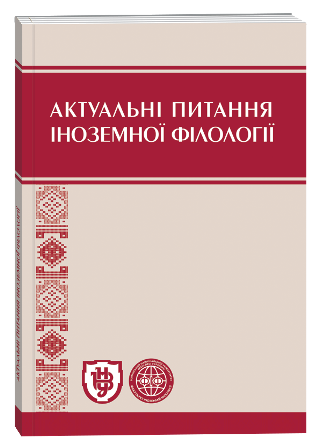SPECIFICS OF TRADE OBJECTS’ NAMING IN THE CITY OF LONDON
DOI:
https://doi.org/10.32782/2410-0927-2023-18-7Keywords:
onym, ergonym, antroponym, toponym, transonymization, apellative, borrowed nameAbstract
The article is devoted to the study of the peculiarities of naming the objects of trade business, which have been collected in London during the last twenty years. The aim of the work is to analyze the names of trade objects of London according to their lexical, semantic and structural features. The research was carried out using descriptive, areal and statistical scientific methods. The scientific novelty of the work is represented by the fact that a new group of ergonyms, containing 975 names of trade business objects recorded in the city of London, has been introduced into scientific circulation. Mainly the names are presented in English, as well as available names borrowed from other languages. The main way of names formation is appellativian. These ergonyms have been analyzed and an attempt to classify them has been made. The names of trade objects of London with appellativian origin, have been conditionally divided into subgroups. Names with an unveiled indication of the type of activity, goods, quality of goods and services, location, abstract appellativian names with a romantic or fantasy content, names, pointing to national traditions, with a connection to the royal past and present of the country are presented. There are also names formed from the names of plants, birds, animals, as well as names of colors with positive connotations, names indicating family relationships. The names analyzed in this paper have positive stylistic meanings and perform an advertising function. Particular attention is paid to the onymian method of English ergonyms formation. Among the onymian names there are various ergonyms, formed by the transonymization of antroponyms, toponyms and other subgroups of onyms. The names, formed by transonymization of toponyms and antroponyms, are distinguished as the most numerous ones. Among the names of London trade establishments, foreign names are widely used. They are mainly borrowed from Italian, Spanish, Latin, German, French.
References
Белей О.О. Сучасна українська ергонімія: власни назви підприємств Закарпаття. – Ужгород, 1999. – 111 с.
Белей О.О. Сучасна українська ергонімія (на матеріалі власних назв підприємств Закарпатської області). – Автореф. дис. ... канд. філол. н.: 10.02.01. – Львів, 2000. – 17 с.
Бучко Д.Г., Ткачова Н.В. Словник української ономастичної термінології. Харків: Ранок-НТ, 2012. 256 с.
Вінарева О.В. Структурний, семантичний і прагматичний аспекти англомовних торгових назв (на матеріалі веб-сайтів мережі Інтернет). Автореф. дис. … канд. філол. н.: 10.02.04. Київ, 2005. 19 с.
Дідур Ю.І. Іншомовні пропріальні одиниці як невід’ємний складник ергоніміконів столиць. Наукові записки КДПУ ім. В.К. Винниченка, 2014. – Вип. 129. – 536 с. – С. 262–265.
Дідур Ю.І. Особливості функціонування ергонімів у мові, мовленні та ментальному лексиконі (в українській, англійській та російській мовах): дис. ... канд. філол. н.: 10.02.15. Одеса, 2015. 195 с.
Зимовець Г.В. Ергоніми банківської сфери в німецькій мові: семантичний і прагматичний аспекти. Наукові записки Тернопільського національного педагогічного університету. Серія: Мовознавство. Тернопіль. Вип. 1(27) 2017. С. 131–135.
Мікіна О.Г. Номінаційні процеси у сучасній європейській єргонімії. Автореф. дис. ... канд. філол. н.: 10.02.19. Донецьк, 1993. 21 с.
Позніхіренко Ю.І. Мотиваційна база ергонімів як знаків соціокультурного простору України й англомовних країн (на матеріалі назв закладів харчування). Дис. ... канд. філол. н.: 10.02.17. Київ, 2018. 264 с.
Сидоренко О.М. Специфіка іменувань готелів на острові Сицилія. Італійська культура в становленні європейської цивілізації:матеріали Міжнародної науково-практичної конференції 21 жовтня 2020 року : Маріуполь : МДУ, 2020. С. 115–117.







